Teen dream lives on for five decades: From Terre Haute basement to onstage with Kiss
- Oops!Something went wrong.Please try again later.
Bill Starkey reported for duty Saturday one final time as the unlikely commander-in-chief of an army with loyal troops spread across the globe.
His appearance at Gainbridge Fieldhouse was likely the end of a surreal odyssey that began almost 50 years ago in Terre Haute and culminated Saturday with the 67-year-old getting a shout out from Kiss frontman Paul Stanley and a roaring ovation from the thousands of fans attending the iconic band's 27th and final concert in Indiana.
As the mild-mannered Indianapolis Public School educator stood in the second row surrounded by generations of Kiss fans, Stanley told a slightly romanticized story of how Starkey (along with his high school friend, Jay Evans) started a groundswell of fans who joined their Kiss Army.
"It just takes one person with a little bit of balls and independence to make things happen ... ," Stanley shouted in his sing-song stage voice. "That was the start of the Kiss Army — and you are the Kiss Army 2023."
Kiss in Indy: See photos from 'The End of the Road World Tour'
Kiss, which was inducted into the Rock & Roll Hall of Fame in 2014, has four more show scheduled on what is billed as its farewell End of the Road World Tour.
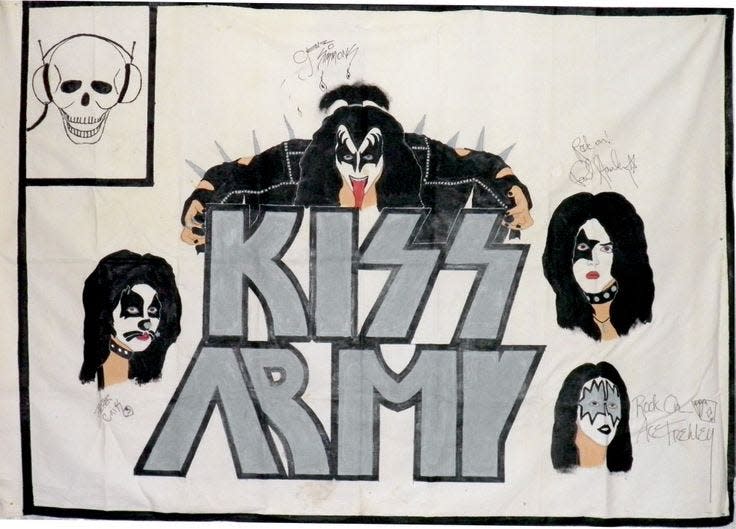
The roots of the DIY group that evolved into the official Kiss fan club stretch back to 1975 and the basement of Starkey's home in Terre Haute. And if you think the origin story sounds like a prequel to "Wayne's World," you'd be right. The juggernaut that eventually grew to nearly 100,000 members, while raking in as much as $5,000 a day for the merchandising savvy band, started with Starkey and Evans pestering their local radio station to play music by an up-and-coming band called Kiss.
In their calls and letters, the teens referred to themselves as the Kiss Army. The name stuck as the band exploded into an international sensation.
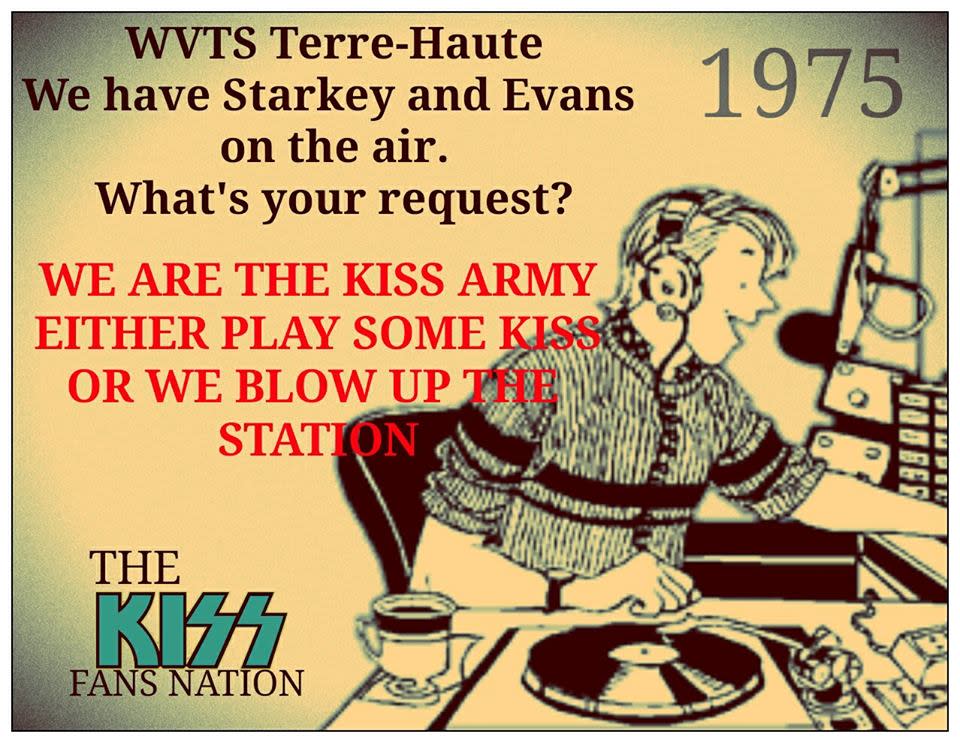
Unbelievably, the basement hijinks resulted in Starkey meeting the members of Kiss and he's stayed in sporadic contact with the band over the years on his way to becoming a footnote in the group's history.
Starkey's role as "commander-in-chief" didn't last long, nor did he and Evans get a cut of the profits. But that was never the goal. Nearly 50 years later, Starkey said he's just happy to have been along for the band's rise to fame — and surprised by the attention he still receives all these years later.
"It didn't do anything for my love life or bank account, but that doesn't make me disappointed or bitter or whatever," Starkey said after the show. "Let's just put this way: I met a lot of cool people and still do, and it's cool to get that much of attention 48 years later, you know. I guess that's the amazing thing."
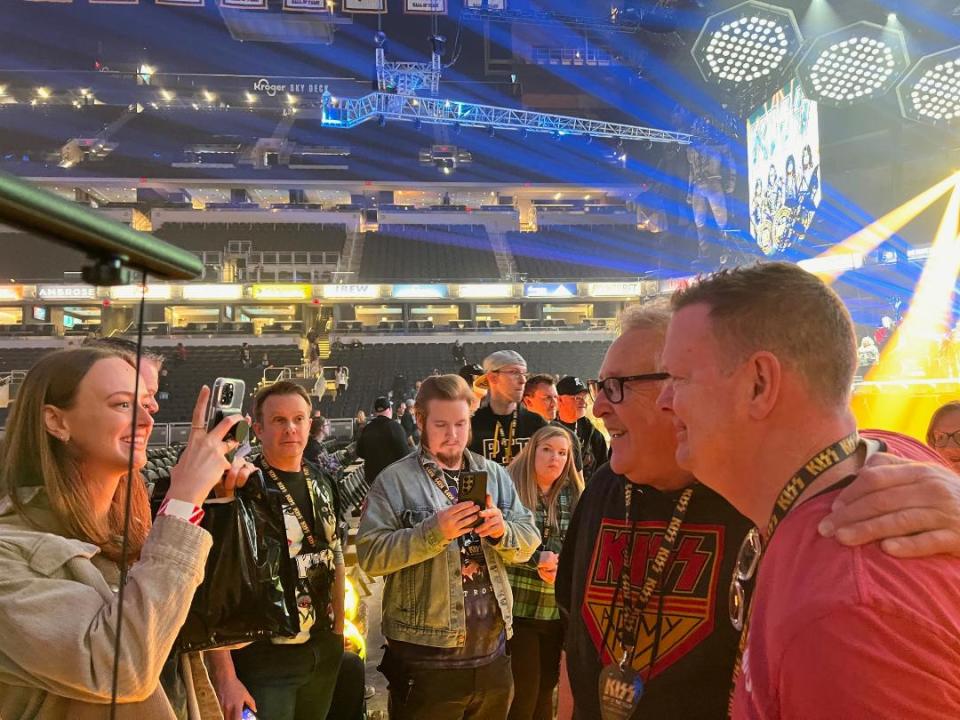
That certainly was the case Saturday, when Starkey also was recognized by the band at the afternoon soundcheck and besieged by fans wanting pictures with the man who started the Kiss Army.
A barrage of phone calls and letters
Starkey first saw Kiss when his father got him tickets to the band's 1974 concert in Evansville. It was his first concert, but the teen was convinced he'd seen something special. At the time, Kiss wasn't even the headliner. His opinion was confirmed after attending a second show a few weeks later in Indianapolis.
Back in Terre Haute, Starkey and Evans began calling the request line at local radio station WVTS to ask for Kiss songs. After weeks with no success, they learned program director Rich Dickerson didn't care for Kiss, which he reportedly called a second-rate version of Bachman Turner Overdrive.
"Well, we thought that was the biggest insult you could get," Starkey said. "So we had this feud that would go on and on for months, and I would write threatening letters to the radio station saying, 'play kiss, or we're going to blow the station up.' You know, back in those days, you could do that kind of stuff and it would just be laughed off ... We were just having fun."
The back-and-forth spanned about the first eight months in 1975 with little success. But when Kiss scheduled a show in Terre Haute, Dickerson reached out to Starkey with a proposal: Send some more of "those stupid letters" and he would read them on the air in the weeks before the November concert.
"We'll call it the Kiss Army letter of the day," Dickerson said.
The stunt worked. The Hulman Center sold out, which wasn't typical for other concerts the station promoted or Kiss shows at the time. The sellout got the attention of the band's management. They wanted to know what the radio station had done to promote the show.
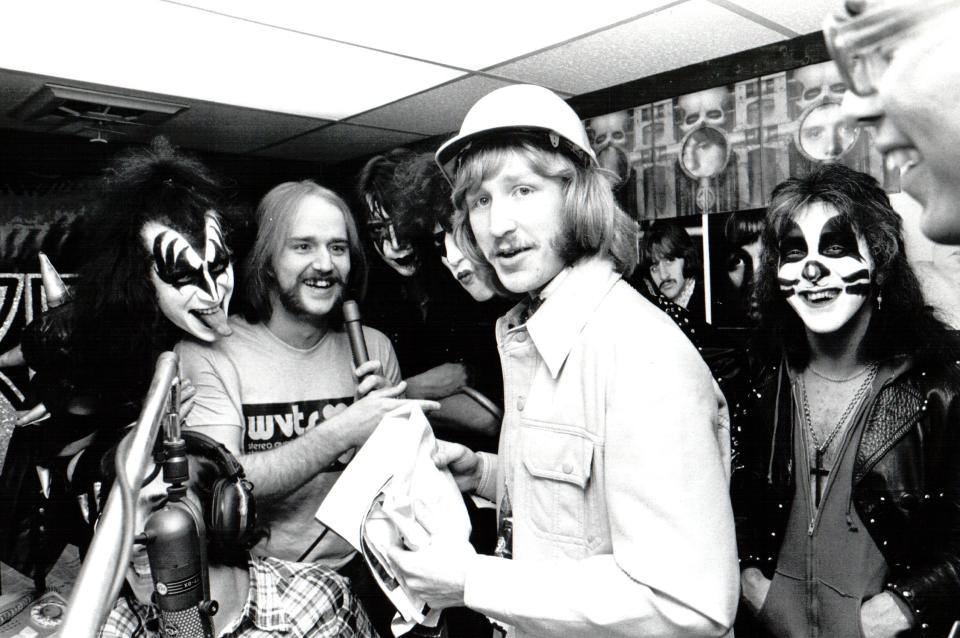
"All they could come up with, and what they said was, 'Well, these two crazy kids calling themselves the Kiss Army have been bugging us for like nine months,'" Starkey said. "And that's how Kiss got in contact with us."
For the next few weeks, Starkey would make collect calls almost daily to the band's management company in New York, which directed him and Evans to continue whipping up interest in Kiss. Their marching orders included helping stage a greeting at the airport. Starkey was also asked to round up some women for the afterparty, a task he said was far outside his wheelhouse.
"I'm like, I couldn't get a date for the prom and you're expecting me to do this?" he recalled thinking at the time. "My only concern was to get my co-partner, Jay Evans, and my brother and my cousin and all the other kids that I had painted up, into the afterparty. That was my main thing because they were fans, and they deserve to be in part of the celebration."
His efforts paid off. Starkey was called on stage during he concert and presented with a plaque making him an honorary member of the band. After the show, he and several friends made it into the afterparty at a local Chinese restaurant, where they ate pizza and chatted with members of Kiss and the opening act, an up-and-coming Canadian trio called Rush.
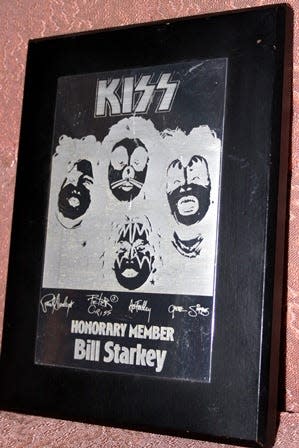
"It was kind of cool for a bunch of 18-year-old kids," Starkey said, "because it just doesn't happen."
Tow months later, the band flew Starkey to New York City for a New Year's show.
"If you don't think my head was spinning at the Terre Haute show, can you imagine I'm going to New York by myself and I'm on like the 30th floor of a skyscraper at two in the morning with Kiss at a pool party," he said.
During the trip Starkey gave his first national interview with "Rolling Stone," which helped accelerate interest in the Kiss Army.
Kiss Army surrendered to band management
Starkey's time as commander-in-chief only lasted a few more months before the band's management took over operation of the Kiss Army. He did some consulting with the new operators and remained a fan — in part due to the music, but also because of how his idols had treated him.
Starkey said he drifted away from the band as infighting led to changes in the lineup and a series solo albums. He called that period, including when the band played without makeup, their Bon Jovi era.
Still, Starkey said Kiss will always have a special place in his heart and life. And he was excited to see the band again during the farewell tour. He gave the Gainbridge show two thumbs up.
"I can be very objective and critical since I'm not in the game — I'm not on the payroll or anything like that. I thought they did a pretty damn good job and I would challenge anybody that left there disappointed," he said. ""I think that they did a really good job. And here's the ironic thing about it all. It seems like they can't be any better than they are right now and there's only a few shows left. So it's like we've waited this long for the ultimate Kiss show and it's gonna go away in another week. That was weird."
Starkey stopped short, however, of calling it the best Kiss concert he has seen.
"It will never top the '75 show when you're called on stage with the original people because that was so unexpected," he said. "This is right up there at the top, though. Maybe number two."
Is there more to come
What's next for the band, and for Starkey, remains to be seen.
Starkey said founding the Kiss Army didn't materially change his life, but it was a nice diversion to say the least. He said someone from Kiss once told him if none of that ever happened "your life probably would be no better or different than where you are right now."
But his ties to Kiss remain a part of his life. He's attended fan convention, does podcasts and has a presence on social media. He said interest is up as the final tour winds down to a pair of shows in New York. As for his story, he thinks it might make an interesting documentary.
"Maybe the chapter's not closed on this book yet," he said Sunday. "But tomorrow, I go back to teaching. It's back to the real world."
This article originally appeared on Indianapolis Star: 'Commander' Bill Starkey recalls the Hoosier roots of the Kiss Army

